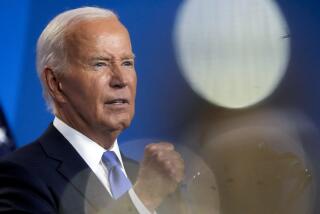Democrats Pondering Changes to Primaries
- Share via
CHICAGO — Democrats, looking to reverse their fortunes after two straight White House defeats, met Saturday to hear competing proposals to revamp the election calendar used to choose a presidential nominee every four years.
The three major proposals would focus on regional primaries. Two of those proposals would allow Iowa and New Hampshire to retain their leadoff roles in the candidate selection process.
A third plan, offered by Michigan Democrats, would create a rotating series of six regional primaries. A different region would launch each presidential nominating season.
That plan would allow single-state contests to begin the process, but those states would be rotated. “Share the wealth,” said Michigan Sen. Carl Levin. “I would not lock in specific states.”
The proposals were made before a commission selected by the Democratic National Committee.
Activists from Iowa and New Hampshire vowed to fiercely defend their leadoff status, and said the problem the party faced was excessive “front-loading.” In 2004, 30 states had held delegate selection contests by mid-March.
Former New Hampshire Gov. Jeanne Shaheen argued that the crush of early states takes influence away from voters in later states. “I think front-loading is one of the issues we want to address,” said Shaheen.
Iowa Sen. Tom Harkin defended his state’s position.
“It emphasizes face-to-face politics, not big money,” Harkin said. “There should be a role in the beginning of our process for the party faithful.”
New Hampshire Gov. John Lynch argued: “With 85 years of ingrained tradition, the New Hampshire primary forces candidates to answer questions. Having that opportunity not only makes them better candidates, it makes them better presidents.”
But Michigan Democrats contend that the leadoff roles of Iowa and New Hampshire give two tiny and unrepresentative states disproportionate influence on whom the party picks.
“This must be changed,” said Tina Abbott of the Michigan Democratic Party. “Under the current system, millions of votes in later states count for nothing.”
Levin criticized “this perpetual privilege that two states have.” He said, “What’s at stake here is nothing less than a struggle for political equality and political relevance.”
The National Assn. of Secretaries of State favored a plan that would divide the country into four regions, which would hold rotating primaries. Those elections would follow Iowa’s leadoff caucuses and New Hampshire’s opening primary.
“Iowa and New Hampshire have both tradition and success,” said Leslie Reynolds, a spokeswoman for the group.
Democrats for the West pushed for an early primary group of eight interior Western states that would vote after Iowa and New Hampshire.
Brian Kuehl of that group said the region was the fastest growing in the nation, and represents prime areas where Democrats can gain.
“We believe that with coordinated regional party-building efforts and concerted attention from the Democratic presidential candidates, many Western states will endorse the Democratic nominee in 2008,” Kuehl said.
The commission plans to debate the proposals in October and recommend any changes in December.
Republicans are planning to launch their 2008 nominating process in Iowa and New Hampshire, and potential candidates have begun the painstaking process of courting key activists.
More to Read
Get the L.A. Times Politics newsletter
Deeply reported insights into legislation, politics and policy from Sacramento, Washington and beyond. In your inbox twice per week.
You may occasionally receive promotional content from the Los Angeles Times.










